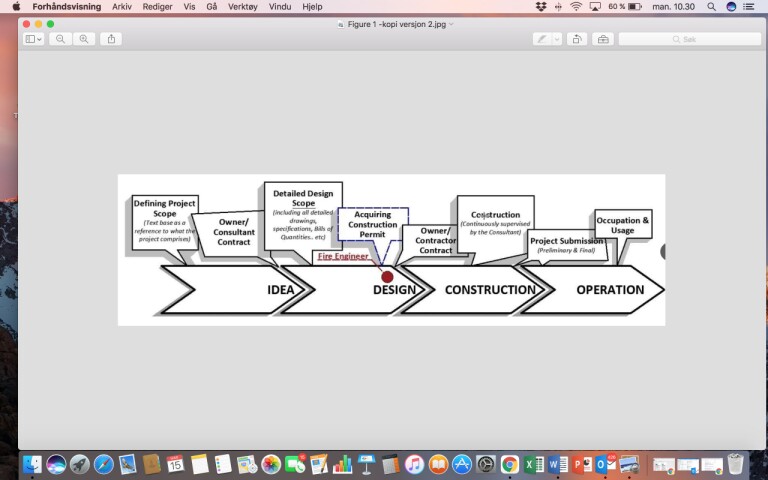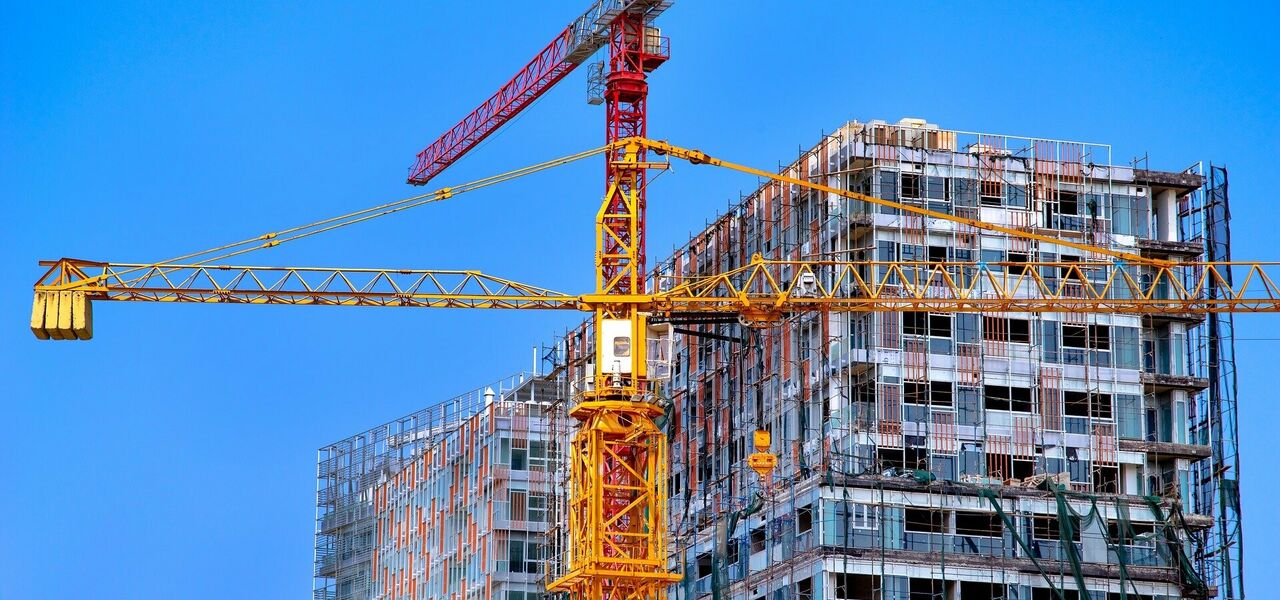

Fire Safety in Lebanon is an almost non existing feature, so how can it be improved? First of all: let’s try and understand the construction process in Lebanon.
The process of constructing a building in Lebanon and eventually putting it into use is conducted through a series of procedures and steps, as is mentioned in Figure 1 and will be further elaborated below. However, it is worth noting here that in the case of public buildings, it is obligatory to go through a public bid to choose the main and sub-contractors, and it includes specific rules and regulations set by the government for each building.
Project Scope
As a first step, and similar to the Norwegian systems, the project scope has to be defined. This is usually done by the owner and their consultants. A project scope is that which includes the main requirements of a project (building type, size, lot location, capacity, general approximate budget, project stakeholders, specific requirements, etc.) The scope should be able to provide a clear understanding of the needs of the project, at its preliminary stages. The project scope is what allows the owner to draft a contract with their consultant.
Detailed Design Scope
What follows is a detailed design scope, specifying every aspect of the requirements of the project, along with a stricter budget. Unlike the project scope which typically consists of text, the detailed project scope usually includes architectural drawings of the project along with minor civil and mechanical drawings. This step allows for the recruitment of contractors for the project. The contract specifies owner-contractor relationship in terms of Scope of Work, Payment Terms, Responsibilities of both parties, Project Change Notice, Insurance & Risk Management, Force Majeure, Schedule Guarantees, Subcontracts, Applicable Law, and Arbitration procedures.
Simultaneously, the consultant would be working on achieving the required approvals. Contrary to other countries which require permits and approvals for governmental parties, civil defense authorities, and fire brigades, the only authority in Lebanon responsible for issuing those approvals is the Order of Engineers and Architects. Although it is a non-governmental syndicate, it is responsible for representing engineers of all majors and architects in Lebanon. It governs the whole construction industry through several aspects, mainly through issuing construction permits.
Until this point, fire safety is still not considered within the project. The introduction of a fire engineer is shown in Figure 1 as an indication of the earliest point of introduction, which is, in most cases, done in much later stages, if done at all. This is the main aspect that needs to be fully evolved and improved.
Building Codes
On the other hand, the only obligatory building codes are those stated by the order as “Building Laws and Regulations”. These set of rules and regulations are divided into prescriptive codes and performance-based codes, exactly as the ones in the Norwegian system. As those codes were derived from the French ones, they are extremely similar to those applied in the EU. A prescriptive code is that which states how the building is to be constructed, while a performance-based code states how the building is to perform.
Those set of rules range from covering major issues such as building footprints, setbacks, and parking requirements, all the way into very minor details such as wall and slab thicknesses. It also includes some environmental concerns embedded within those codes (such as exempting buildings with double walls and clay tiles from certain taxes1, which has been lately drastically improving. For example, this overview shows the number of studies registered at the syndicate, as some of those studies have become mandatory in 2017. It is worth mentioning that “Technical Reports” include those conducted for Fire Safety measures, which are still not a requirement in Lebanon. Unfortunately, only 417 studies have been done within a total of 13,861 building permits (only 3%) acquired within the same year (2).
Study Type Number
Traffic Impact Study: 104
Geotechnical Study (Soil): 1863
Technical Reports Study: 417
(This is showing the Number of Supplementary studies registered in 2019.)
Space for Personal Initiatives
While the building law only asks for the existence of fire exits as safety measures, what could be regarded as a positive aspect is that most consultants are resorting to certain fire safety measures as a personal initiative. This is because insurance companies are requiring an incorporation of basic fire safety measures as a condition for coverage. However, very basic studies are being conducted and usually they’re just going with the easiest and most available solutions, namely basic fire detection systems and sprinklers. Nevertheless, it is an important step forward, even though it only currently applies to public and commercial buildings and excludes residential ones.
1. Based on the Lebanese Law of Construction, modified continuously to include current environmental concerns, in which the part related to double walls was put into action in 2005. (Order of Engineers & Architects in Lebanon). However, both the website and the construction law document are only published in Arabic.
2. Based on the annual report published by the Order of Engineers and Architects in Lebanon for 2019. Order of Engineers & Architects in Lebanon.)
Approvals and Construction
A scientific committee of engineers and architects (which still does not include a fire safety engineer) at the order study the project and provide their approval for construction or the requirement of certain aspects so that the project conforms with building laws and regulations. Once the necessary approvals are acquired, the consultant then presents their project to the municipality which the project falls under its jurisdiction, on an informative basis only. The construction permit is usually granted at this stage, and it is the only permit required when constructing a project. The construction can then initiate.
The Current Situation and How to Change That
Thus, as a conclusion, we find that the systems in Lebanon is still very much lacking when it comes to fire safety. Since we’re on the verge of rebuilding the country, several steps need to be taken to mitigate that issue. First, educated fire engineers need to become part of the system. This would start by introducing fire education into the Lebanese system to begin with, as it is currently nonexistent. Once those fire engineers are embedded into both the design and approval phases of a project, they can start molding the new rules and regulations. The construction law in Lebanon is extremely outdated and modifications to that so it fits the world shift towards enhanced safety and sustainability are long overdue. Once fire safety and accordingly life safety starts being regarded as an utter necessity rather a “nice to have” commodity, everything will change.
Hope
Life safety is of utmost importance, and Lebanon is unfortunately far behind on that aspect. Yet, the new generation of educated professionals is more than capable of achieving the full potential a great country such as Lebanon has to offer. Change starts with us.
Om journalisten:
Amani er en libanesisk arkitektingeniør med en spesiell interesse for fagfeltet sikkerhet. Hun har også en Mastergrad i brannsikkerhet fra Høgskulen på Vestlandet (HVL), som hun var ferdig med i 2020. Hun har siden begynnelsen av 2021 jobbet som Graduate Fire Engineer ved Arup UK.

